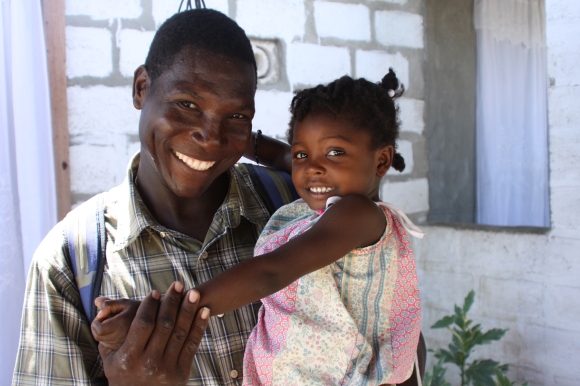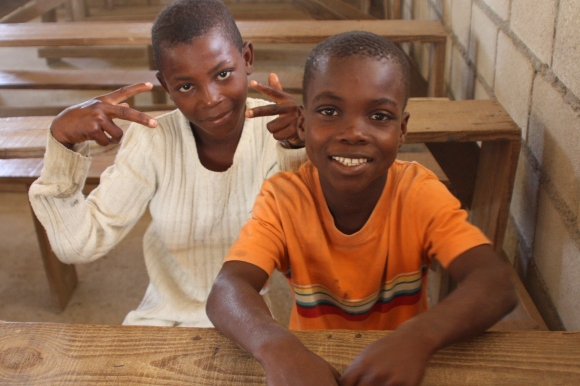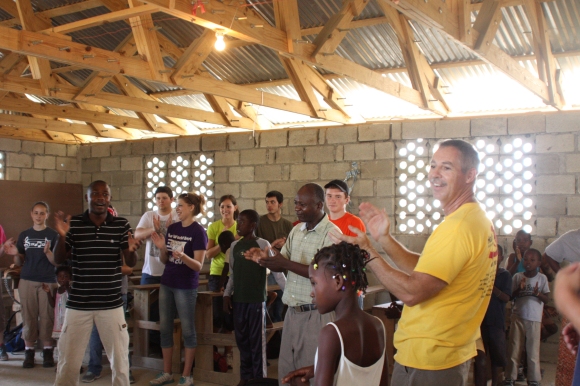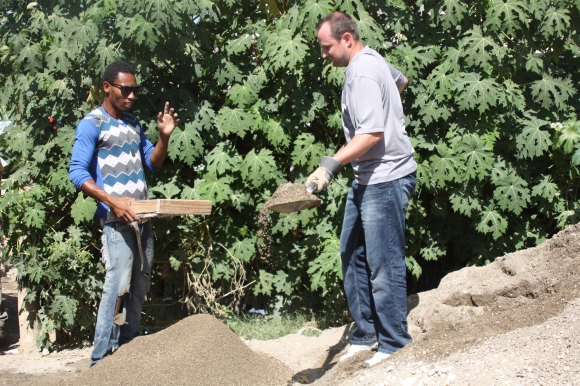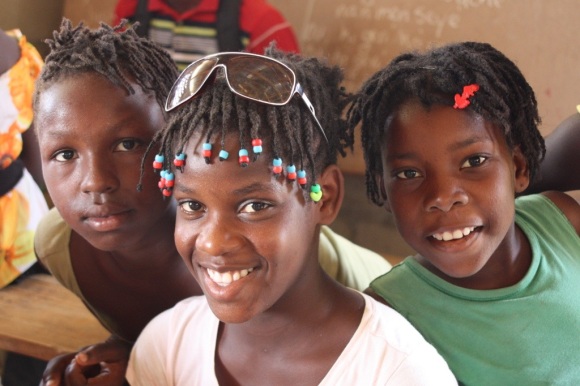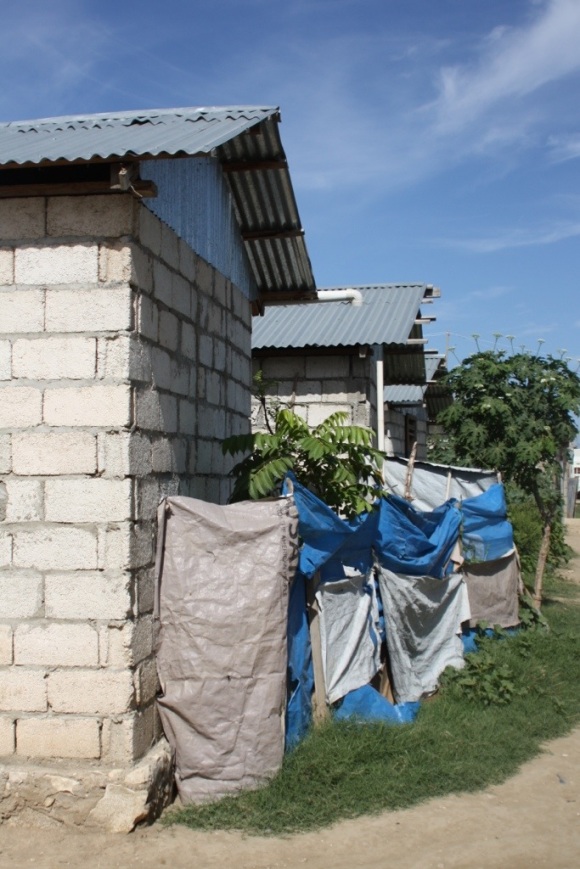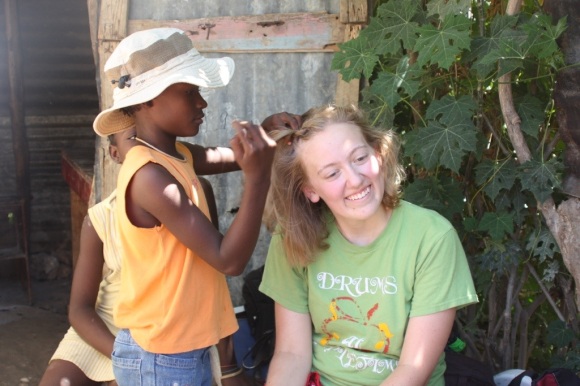On our last day in Haiti, the team shares their most memorable moments:

Autumn Wetzler, Waterloo, first trip to Haiti: It’s hard to pick one. Probably whenever I was out evangelizing and asked an elderly man about what God was doing in his life. He said he accepted Christ in 1981 and that his children were healthy and he was healthy. It was just neat to see how faithful he was throughout his life and how God was faithful to him. Or when we went to the orphanage and were rocking all the kids and they all feel asleep in our arms.

Courtney Fallon, Columbia, first trip to Haiti: I found it just really beautiful how everyone lives their lives every day, and how they support each other and love each other. It amazed me how happy the children were, because in our American minds, we think you have to have stuff to be happy. But it’s not true. Sometimes I think they’re happier here than we are. It was also awesome to see the team interact with everyone the kids, even though we’re different from one another.

Harli Tracy, Robinson, third trip to Haiti: I think on this trip, I’ve gotten closer to the people on my team and the people in Bigarade (where we worked) than I have before, and I’ve built more relationships this time. All the trips were really special in their own way- every time I’ve thought this one was the best. I don’t know, I think they’re all equal.

Tad Arndt, Columbia, first trip to Haiti: The most memorable thing was probably the fan club of kids that followed me around. Even though language was a little barrier for us for a little while, we still connected. And it was really neat to see that you don’t need language to connect with people- God can connect us.

Bob Elmore (left), Springfield, has led multiple trips to Haiti: Watching Americans and Haitians share the Gospel. Not us presenting the Gospel and the Haitians translating, but together sharing Christ.

Emily Ebert, Carlinville, second trip to Haiti: I found myself overwhelmed by the amount of love and trust I was given on this trip by the people of Haiti. Within the first three minutes of meeting a child, I have completely exhausted my conversational Creole, yet the children stay around all day, just to be with me. At the end of the day when I get on the tap-tap, I know that tomorrow their smiling faces will greet me, ready to spend another day playing clapping games. And that is when it hits me: I love these people. I love every hot and smelly, wonderful and beautiful part of this country, this culture and these people. And even on Sunday when I leave Haiti, I know I will see them again, because eternity starts now.

Lynzie Emerson (left), Springfield, second trip to Haiti: This year I just felt like the team got along like one big group. I think I built more relationships with the kids this year. I love the fact that they’re so content with just the littlest things we give them, like dolls. And even though they’ve gone through a lot of hard times, thy just smile at us, and just appreciate any type of love that we show them. They don’t know us, but they just come to us and cling to us like they’ve know us their whole lives.
Lindsay Wasson (right), Harrisburg, second trip to Haiti: It’s waking up every morning with the feeling that I’m doing exactly what I was created to do. It’s the look in a lost soul’s eyes when you tell them of the hope found in Christ. It’s when a handicapped orphan says, “I love you too Lindsay.” It’s the love shared between believers in Christ that goes beyond all words. But best of all, it’s tearfully saying, “I’ll see you soon,” upon departure.

Chris Flynn (right), Springfield, first trip to Haiti: Our first ride through Port-au-Prince may have been what I expected, but it was still astonishing to see. Desperately poor quality of roads, trash and traffic control, infrastructure in general. Yet the people I met this week remained kind and patient, willing to both learn and teach. For me, Haiti exposed the gifts I keep for myself and still take for granted. And the relationships developed this week, and the truths shared, proved once again that real joy comes not from the gifts, but the Giver.

Cara Atienza, Robinson, first trip to Haiti: What I’ll remember the most is the amount of trust that they put in us even thought they don’t know us. Having children fall asleep on your lap that have never met you and that you’ve never talked to, means a lot. It’s an irreplaceable experience.

Sara Harris’s, Columbia, second trip to Haiti: Getting close to them is harder because it hurts to leave, but it’s more fruitful, because you know you’ll come back to friends you’ve made here. My dad had been here in November and shown some of the kids a picture of me. One of the little girls ran up to me this time and said Sarah, Sarah! I couldn’t believe she remembered my name.

Brian Harriss (second from right), Columbia, third trip to Haiti: Reading the Bible with guys at the work site. We started with a Christian book in Creole, and I had an English copy of the same book. There was Scripture in it, which gave me an opportunity to get out my Bble. Not only was I learning Creole, but they were learning English. It never hit me before: what a way to learn a new language…reading God’s Word.

Jacob Mays, Herrick, first trip to Haiti: Awesome. It was an amazing experience to see things that not many people get to see, and witness to people and share the Gospel. It was just a really great opportunity, and I had a lot of great moments. I’m going to miss the team.

Alex Hancock, Bethalto, first trip to Haiti: The most memorable thing for me is how humbled I was by this trip, and how different things around here are compared to America. It really makes a difference in how you think about the things you have at home.

Levi Doty, Benton, first trip to Haiti: My favorite part of Haiti would have to be that even though these people have next to nothing, they seem to be happy. Even though they don’t have a clue who some of us are, they are willing to let us come to their home and talk to us. One day, some of the group went around and sang, but Brian and I went with an interpreter under our tarp on the work site, and they started to read Scripture in English and then Creole. By the time they were done, there had to be at least 20 Haitians and Americans under the tent. It was awesome.

Matt Kountz (right), Belleville, first trip to Haiti: The regenerating and transforming power of the Gospel in the lives of the Haitians and Americans was what I have been blessed to see every day. I was able to see God work in faithful men to preach the Word in the face of death threats from voodoo practitioners and priests. I was able to see the light of Jesus cut through darkness and the Word of God transform hearts. There is nothing more beautiful then seeing the work of God’s grace on man and I was blessed to be able to witness God working mightily in Haiti.

Riley Tullis, Columbia, first trip to Haiti: Probably my most memorable moment was when we went to one of the houses in Bigarade. I went through the Gospel with three kids about my age. They seemed like church kids. I shared my testimony with them, which was about me coming to Christ as a church kid. It really touched them, and I could see God working. It was like staring the Holy Spirit in the face. We prayed with them and they accepted Christ; I really hope they find a church and grow in Christ.

Abby Fleischer, Carlinville, third trip to Haiti: A common misconception about mission trips is that they are solely about meeting physical needs; however, truthfully and biblically, there is much more to it. In Romans 12:12-13, we get a glimpse of biblical love, something which is clearly demonstrated on a daily basis here. The Haitians and the Americans learn more from each other daily how to love genuinely and sacrificially. We also experience 1 Corinthians 4:20, which states that the Kingdom of God is not of talk, but of power. Language barriers can prove to be a benefit when they show both parties that God often shows His love through other forms that we often fail to recognize.

Meredith Flynn, Springfield, first trip to Haiti: Leading up to our week in Haiti, I was completely focused on how uncomfortable I might be. And even on our first day here, a week seemed like a long time to be this hot, this dusty, this out of my element. But at some point during the week, it became less important for me to feel comfortable. And I know without a doubt I didn’t muster that on my own. It could only be the Lord who helped me get over my American ideals of cleanliness and comfort, and to be patient when a thousand little hands are grasping at my camera for the rare opportunity to see their reflections. Can’t wait to be here again soon.










